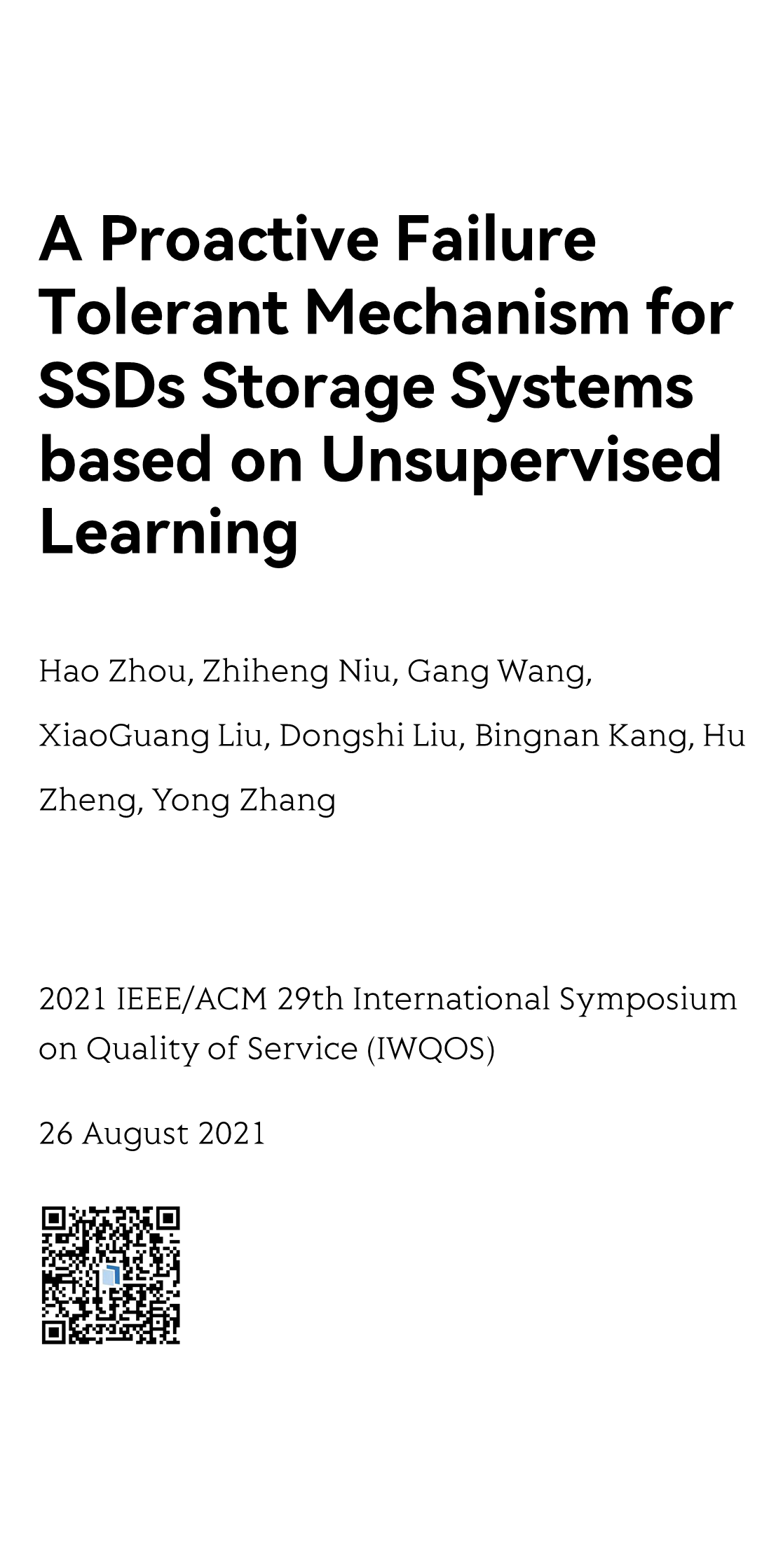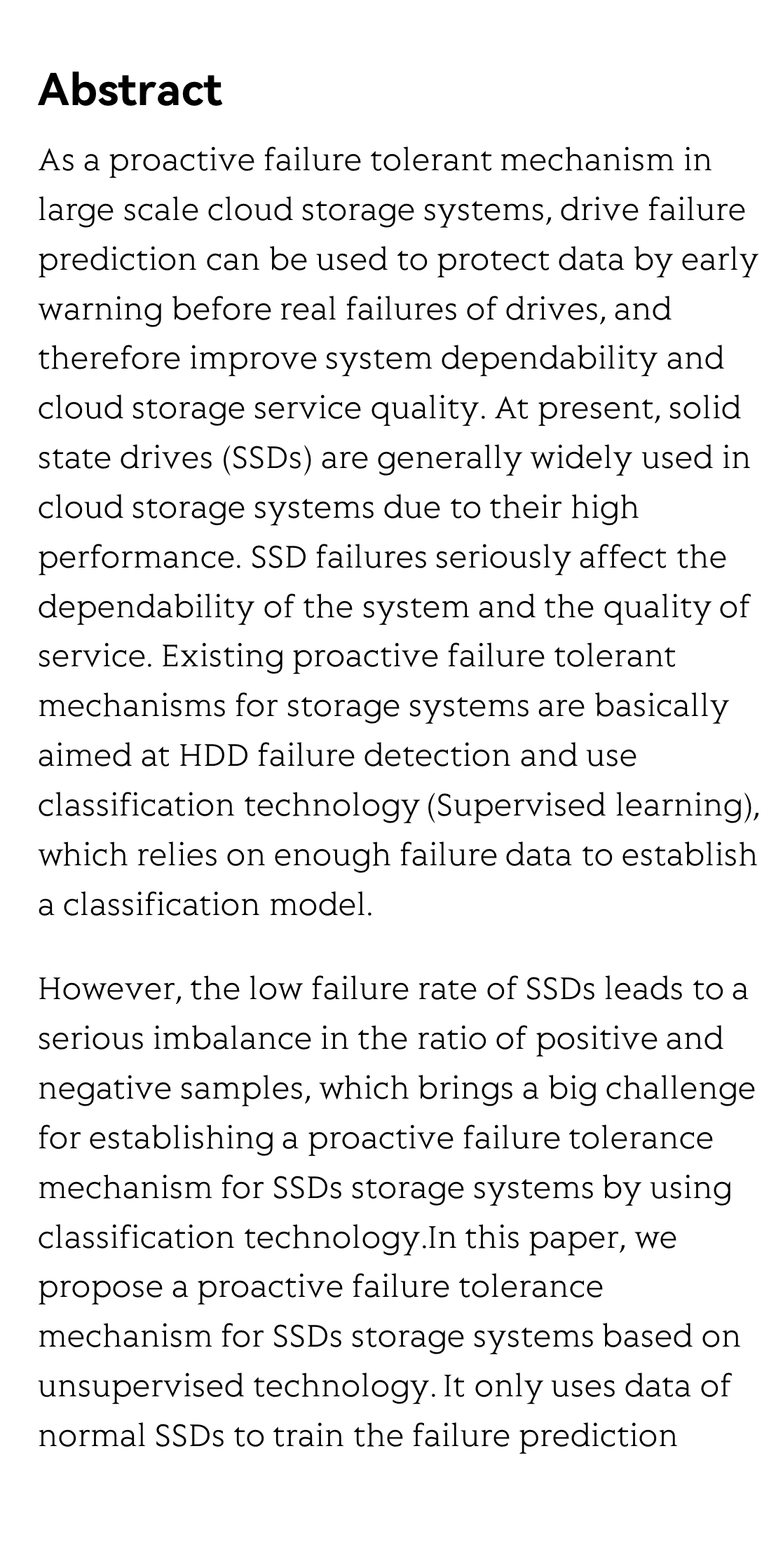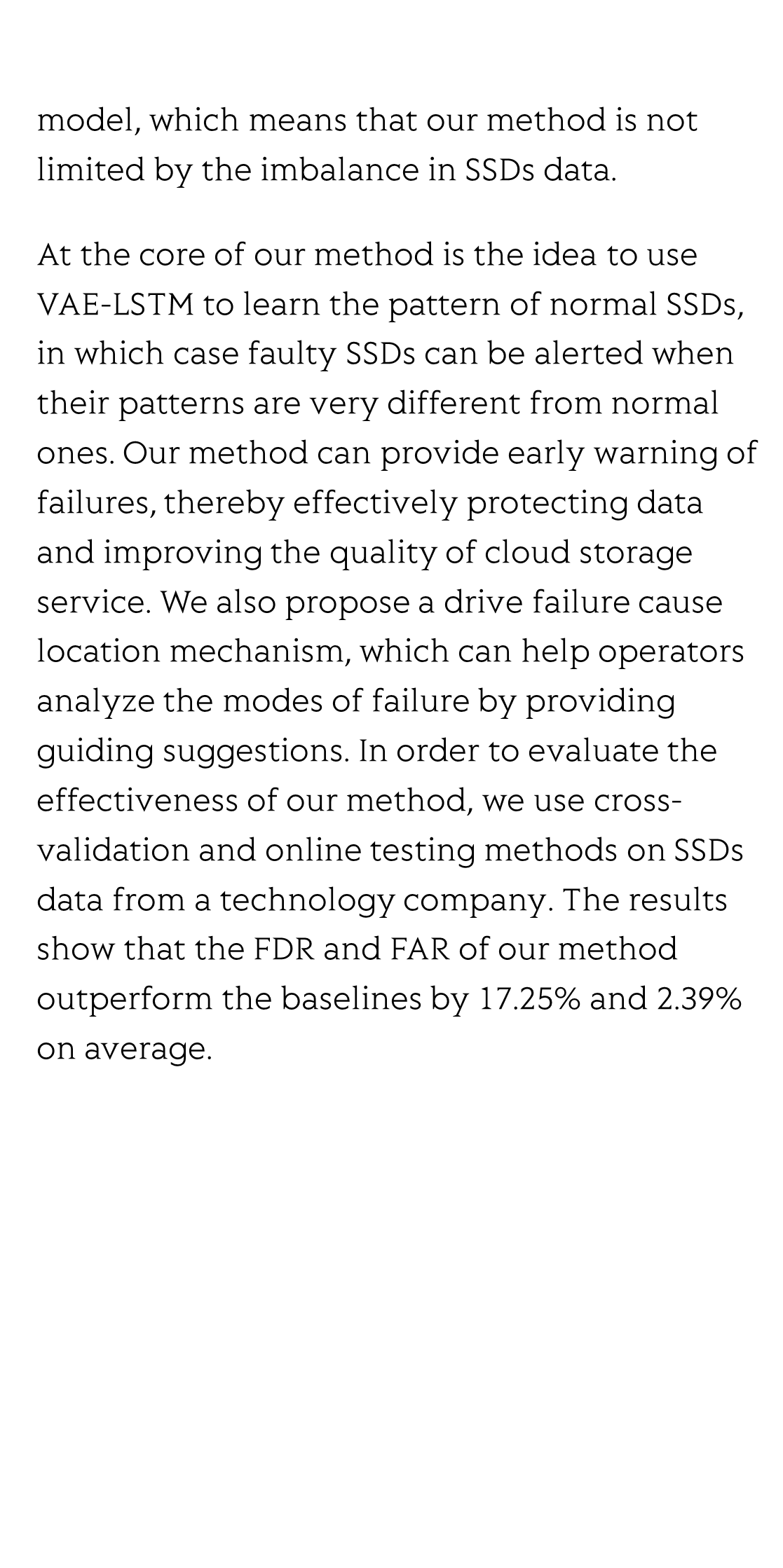(Conference Paper) A Proactive Failure Tolerant Mechanism for SSDs Storage Systems based on Unsupervised Learning
Hao Zhou 周浩 ¹, Zhiheng Niu ², Gang Wang 王刚 ², XiaoGuang Liu 刘晓光 ², Dongshi Liu ³, Bingnan Kang ³, Hu Zheng ³, Yong Zhang ³
¹ College of Cyber Science TJ Key Lab of NDST, Nankai University, Tianjin, China
中国 天津 南开大学网络空间安全学院 天津市网络与数据安全技术重点实验室
² College of Computer Science TJ Key Lab of NDST, Nankai University, Tianjin, China
中国 天津 南开大学计算机学院 天津市网络与数据安全技术重点实验室
³ Huawei
华为
2021 IEEE/ACM 29th International Symposium on Quality of Service (IWQOS)
, 2021-08-26
Abstract
As a proactive failure tolerant mechanism in large scale cloud storage systems, drive failure prediction can be used to protect data by early warning before real failures of drives, and therefore improve system dependability and cloud storage service quality. At present, solid state drives (SSDs) are generally widely used in cloud storage systems due to their high performance. SSD failures seriously affect the dependability of the system and the quality of service. Existing proactive failure tolerant mechanisms for storage systems are basically aimed at HDD failure detection and use classification technology (Supervised learning), which relies on enough failure data to establish a classification model.
However, the low failure rate of SSDs leads to a serious imbalance in the ratio of positive and negative samples, which brings a big challenge for establishing a proactive failure tolerance mechanism for SSDs storage systems by using classification technology.In this paper, we propose a proactive failure tolerance mechanism for SSDs storage systems based on unsupervised technology. It only uses data of normal SSDs to train the failure prediction model, which means that our method is not limited by the imbalance in SSDs data.
At the core of our method is the idea to use VAE-LSTM to learn the pattern of normal SSDs, in which case faulty SSDs can be alerted when their patterns are very different from normal ones. Our method can provide early warning of failures, thereby effectively protecting data and improving the quality of cloud storage service. We also propose a drive failure cause location mechanism, which can help operators analyze the modes of failure by providing guiding suggestions. In order to evaluate the effectiveness of our method, we use cross-validation and online testing methods on SSDs data from a technology company. The results show that the FDR and FAR of our method outperform the baselines by 17.25% and 2.39% on average.
Review for wireless communication technology based on digital encoding metasurfaces
Haojie Zhan, Manna Gu, Ying Tian, Huizhen Feng, Mingmin Zhu, Haomiao Zhou, Yongxing Jin, Ying Tang, Chenxia Li, Bo Fang, Zhi Hong, Xufeng Jing, Le Wang
Opto-Electronic Advances
2025-07-17
Multiphoton intravital microscopy in small animals of long-term mitochondrial dynamics based on super‐resolution radial fluctuations
Saeed Bohlooli Darian, Jeongmin Oh, Bjorn Paulson, Minju Cho, Globinna Kim, Eunyoung Tak, Inki Kim, Chan-Gi Pack, Jung-Man Namgoong, In-Jeoung Baek, Jun Ki Kim
Opto-Electronic Advances
2025-07-17
Non-volatile tunable multispectral compatible infrared camouflage based on the infrared radiation characteristics of Rosaceae plants
Xin Li, Xinye Liao, Junxiang Zeng, Zao Yi, Xin He, Jiagui Wu, Huan Chen, Zhaojian Zhang, Yang Yu, Zhengfu Zhang, Sha Huang, Junbo Yang
Opto-Electronic Advances
2025-07-09
CW laser damage of ceramics induced by air filament
Chuan Guo, Kai Li, Zelin Liu, Yuyang Chen, Junyang Xu, Zhou Li, Wenda Cui, Changqing Song, Cong Wang, Xianshi Jia, Ji'an Duan, Kai Han
Opto-Electronic Advances
2025-06-27
Operando monitoring of state of health for lithium battery via fiber optic ultrasound imaging system
Chen Geng, Wang Anqi, Zhang Yi, Zhang Fujun, Xu Dongchen, Liu Yueqi, Zhang Zhi, Yan Zhijun, Li Zhen, Li Hao, Sun Qizhen
Opto-Electronic Science
2025-06-25
Observation of polaronic state assisted sub-bandgap saturable absorption
Li Zhou, Yiduo Wang, Jianlong Kang, Xin Li, Quan Long, Xianming Zhong, Zhihui Chen, Chuanjia Tong, Keqiang Chen, Zi-Lan Deng, Zhengwei Zhang, Chuan-Cun Shu, Yongbo Yuan, Xiang Ni, Si Xiao, Xiangping Li, Yingwei Wang, Jun He
Opto-Electronic Advances
2025-06-19





